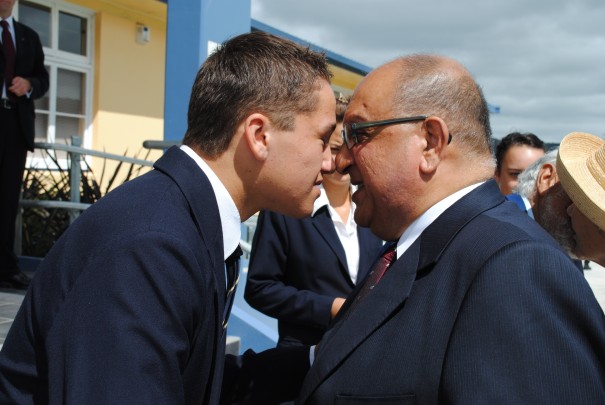Bay of Islands College Visit

For more photos, click here.
I begin by greeting everyone in the languages of the realm of New Zealand, in English, Māori, Cook Island Māori, Niuean, Tokelauan and New Zealand Sign Language. Greetings, Kia Ora, Kia Orana, Fakalofa Lahi Atu, Taloha Ni and as it is the morning (Sign)
I then specifically greet you: Gary Hooson, Chairperson of the Bay of Islands College Board of Trustees; College Principal Elgin Edwards, and members of your staff; Wimetu Te Whiu, Head of the Māori Department and College kaumatua; students; Distinguished Guests otherwise; Ladies and Gentlemen.
It has been a pleasure for my wife Susan and I to have the opportunity to visit Bay of Islands College here in Kawakawa today. I am told that this is the first Governor-General visit to your school so it really is good to be here.
I understand that this College was established more than fifty years ago, in 1958 and at the time my predecessor, Lord Cobham, held the Governor-General role. Since then, there have been ten Governors-General, myself included.
Much has changed since that time in history, but what has remained is the importance of the Bay of Islands region in the history of New Zealand.
In two days’ time, on 6 February, New Zealanders will celebrate the 171st Anniversary of the signing of the Treaty of Waitangi. That event took place a mere thirty minute drive from Kawakawa. The Treaty is one of the founding documents of this country’s government and is central to, and symbolic of, New Zealand’s national heritage, identity and future.
The significance of what occurred at Waitangi in 1840 should not be forgotten. Two peoples were able to sit down, debate and agree on terms for how this land should in future be governed.
It remains a remarkable achievement. Many other countries’ national days mark the anniversary of violent events. There are few cases in history where colonisation occurred after the peaceful signing of a Treaty rather than at the point of a gun.
It is important then to understand that history, so that we may better understand the present and prepare for the future.
Your education is the most significant contributor in giving you a broader understanding of who you are, where we have come from, and how our world works. The different subjects you study, be it mathematics, English, history, the arts, or sciences, are based on wisdom and knowledge that spans more than three thousand years of learning.
The ability to use the knowledge you have gained at school, rather than simply being memorised information, is better viewed as a toolbox for questioning and formulating your own views and standing in the world.
In a speech at a University of Auckland Graduation Ceremony, in 1959, Lord Cobham shared the advice he would give to his son on education. He said: “Knowledge can never be an end to itself; it is merely the key that unlocks the door to understanding.”
You may decide to pursue tertiary education, or you may decide to head straight into the workforce. Whatever that choice, what you have learnt in school, including your values and key skills, will assist you in making decisions and will prepare you for what lies ahead.
The success of a College can be measured on the success of its students and, in that regard, this College can be proud of the calibre of its alumni. Those include past students such as Lieutenant Commander Wiremu Leef, who was made Commanding Officer of the Royal New Zealand Navy vessel, HMNZS Manawanui, in May last year and District Court Judge Greg Davis. I made a number of enquiries regarding past students and mention of those two was just the beginning. There have been many senior figures in education, for example Elizabeth Ellis, a long-time ERO coordinator and currently the Commissioner of Te Aute College, and her sister Helen Mountain Hart, herself a teacher and researcher. It also seems that former PM Mike Moore and his family spent time at this College.
Each student here has the potential to be just as successful in life after school as those I have mentioned.
Each student here has the potential to positively contribute to the community and to the wider New Zealand public.
Each student here has the potential to be great. In order to make that a reality, it is important that you persevere in achieving your goals.
French scientist Marie Curie is an example of someone who showed great determination throughout her life. She was a pioneer in the field of radioactivity and the first person to be honoured with two Nobel Prizes. She once said and I quote:
“Life is not easy for any of us. But what of that? We must have perseverance and above all confidence in ourselves. We must believe that we are gifted for something, and that this thing, at whatever cost, must be attained.”
And on that note of encouragement, I will close in New Zealand’s first language Māori, by offering everyone greetings and wishing you all good health and fortitude in your endeavours.
No reira, tēnā koutou, tēnā koutou, kia ora, kia kaha, tēnā koutou katoa.
